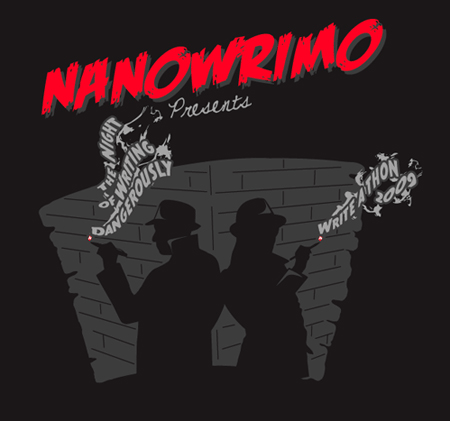It’s getting close to that time of year. Not Halloween, Thanksgiving, Christmas, or any of those other holidays (though you should definitely remember my birthday on December 31). No, I’m talking about National Novel Writing Month! It happens in November, when people who are insane enough sign up to write a complete novel of at least 50,000 words in a single month. I’m participating for the fifteenth time (good Lord!); I did it for the first time in 2001, skipped 2002 because I was traveling a lot for work, and have done it every year since. And every year I’ve hit that 50,000 word goal. And, as I have done every year since 2007, I’ll be one of two Municipal Liaisons in the Sacramento area. This means that it’s up to me and my friend Katster to coordinate participants, arrange meetups and parties, and what-not.
![]()
Usually this is the part where I beg for money to send me to the Night of Writing Dangerously, but I’ve decided not to go this year. It’s fun, but I’ve done it for five years now, and now someone else can have the fun.
Anyway. This year I plan on writing a total of 60,000 words instead of just 50,000. That means a minimum of 2,000 words per day of November. It’ll be tricky, what with visiting family over Thanksgiving and all, but I’m sure I’ll make it work.
The novel I’ll be writing is called And the Devil Will Drag You Under. I got the title from the song “Sit Down You’re Rocking the Boat” from the musical Guys & Dolls. My novel has nothing to do with the musical, or the song, really. I just liked the title. It also has nothing to do with the Jack L. Chalker novel of the same name. And you can’t copyright a novel title, so I’m golden.
Usually I put my novel online as I’m writing it, but I won’t be doing that this time around. I’m too excited about the novel and will hopefully one day clean it up and send it out into the world to be published, and putting it online counts as a form of publication, which might get in the way of my chances to sell first publication rights to anyone. So I won’t be doing that this year.
Here, enjoy the song from Guys & Dolls. It’s a fun song, even if, thematically, it has nothing (or at least, very little) to do with my novel.
 November is right about the corner which, of course, means that
November is right about the corner which, of course, means that 